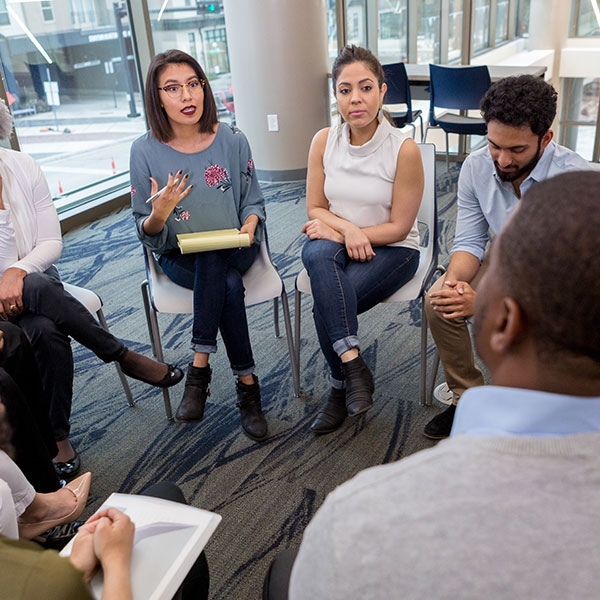How to Become a Licensed Professional Counselor in Texas


We know navigating the process of becoming a licensed clinical mental health counselor can seem daunting. That’s why we’re here to help!
If you’re looking to become a clinical mental health counselor in Texas, you will need to apply to become a licensed professional counselor (LPC), or an LPC Associate to start. You will also need to meet a number of other requirements, which includes passing one of two national licensure exams for counseling.
This career guide walks you through the Texas LPC education and license requirements as well as what to look for when choosing a counseling program.
Meet the Education Requirements

To become a licensed professional counselor in Texas, you need to have a graduate degree in counseling or a counseling-related field from an accredited program.
It’s important to note that you can still take the NCE or NCMHCE licensure exams (more on these later) and obtain LPC licensure in Texas even if you did not graduate from a program that is accredited by the Council for Accreditation of Counseling and Related Educational Programs (CACREP).
If your program was not CACREP-accredited, the state licensing board will simply review the coursework you completed to ensure that it meets the minimum educational requirements for licensure.
West Coast University’s Master of Science in Clinical Mental Health Counseling program is not yet CACREP-accredited, but the university has plans to pursue accreditation once the program is eligible to do so.
WCU’s MS in Clinical Mental Health Counseling program is CACREP-aligned (meaning it is set up to model CACREP standards) and the program will submit its CACREP self-study when the first group of students begins fieldwork in accordance with CACREP procedures. The self-study is the initial step toward the formal process of pursuing CACREP accreditation.
Complete Required Supervised Practice Hours
You will need to complete a minimum of 3,000 hours of supervised practice (includes both direct and indirect combined) before you can be fully licensed as a professional counselor in Texas. At least 1,500 of those hours must be from direct counseling practice.
If you’re an in-state LPC applicant, you must complete your supervised practice hours within the span of 18 to 60 months.
Understand the Different Licensure Exams
Before you become a licensed professional counselor in Texas, you will need to pass one of two counselor licensure exams: the National Counselor Exam (NCE) or the National Clinical Mental Health Counseling Examination (NCMHCE), which are each administered by the National Board for Certified Counselors (NBCC).

What’s the difference between the NCE and NCMHCE?
The NCE is the exam that was originally used starting in 1983 as part of the process of applying to become a National Certified Counselor (NCC) and it is still used to this day. The NCMHCE is an exam that can be used to fulfill the requirements for both the NCC certification and the Certified Clinical Mental Health Counselor (CCMHC) specialty certification.
The CCMHC certification exam was first developed by the American Mental Health Counselors Association and then later expanded into a national exam overseen by the NBCC in the early 1990s. The NCMHCE was designed to use real-world simulated cases to reflect the clinical requirements that are central to the profession of counselors.
The NCE is a multiple-choice test that consists of 200 questions, with only 160 of the questions being scored. The scored questions are on the following topics in the following percentages:
- Professional Practice and Ethics – 12%
- Intake, Assessment, and Diagnosis – 12%
- Areas of Clinical Focus – 29%
- Treatment Planning – 9%
- Counseling Skills and Interventions – 30%
- Core Counseling Attributes – 8%
While the NCMHCE consists of 11 case studies, with only 10 being scored. Each case study includes one narrative and 9 to 15 multiple choice questions. Of all the multiple-choice questions on the test, a total of 100 questions will be scored.
The exam questions cover the following topics in the following percentages:
- Professional Practice and Ethics – 10-20%
- Intake, Assessment, and Diagnosis – 20-30%
- Treatment Planning – 10-20%
- Counseling Skills and Interventions – 25-35%
- Core Counseling Attributes – 10-20%
The NCMHCE does not include Areas of Clinical Focus (covering diagnoses and main presenting problems found to be the most common in clinical work) as a formal test question category like the NCE does. This is because this topic is evaluated through various diagnoses and case scenarios that are incorporated into each exam form rather than at the question level.
Apply for Licensure Through the Texas Behavioral Health Executive Council

There are a few different types of professional counselor licenses you can apply for in Texas, including:
- LPC Associate (formerly “Licensed Professional Counselor Intern, or LPCI)
- Upgrade from Associate to LPC
- LPC (coming from a different state)
When you graduate from a mental health counseling master’s program, you will first apply for an LPC Associate license and then upgrade to an LPC license once you complete all your required supervised practice hours.
You can apply to become an LPC through the Texas Behavioral Health Executive Council’s Online Licensing System. Before setting up an account on the system and submitting your electronic application, you should first have all the required documentation completed and scanned to your phone or desktop computer (whatever device you’ll be using to submit your application).
Below is the required documentation for the LPC Associate application.
Documentation to be completed and loaded onto your device:
- Practicum Documentation Form (to be completed by a faculty/administration member from your counseling program)
- Jurisprudence Examination Completion Certificate (You must complete your exam no sooner than six months prior to your application submission. You will be issued a certificate once you complete the exam.)
- Supervisory Agreement Form (to be completed by you and signed by you and your board-approved supervisor)
- Military Supplemental Form (only for qualifying service members and their spouses)
Documentation to be provided by a third-party source:
- NCE/NCMHCE licensure exam scores
- National Practitioner Data Bank (NPDB) self-query report
- Fingerprinting
- Official transcripts
Once you have uploaded all your documentation, you can then set up an account on the Online Licensing System and start your application.
If you’re submitting an LPC application (either as an upgrade from Associate or from out of state), you will need to provide a Supervised Experience Documentation Form Supervisory Agreement form.
If you’re coming from out-of-state and applying from out-of-state, you will need to submit a form for Verification of Licensure in Another State. And if you’re already in the state and upgrading from an Associate to an LPC, you will not have to submit as many forms. See the application documentation requirements for more information.
All applicants must also pay associated application fees.
If you have additional questions about the process of obtaining your LPC Associate or LPC license in Texas, check out these LPC licensure FAQs on the Texas Behavioral Health Executive Council website.
Know What to Look For in a Mental Health Counseling Graduate Program
If you’re looking to start your educational path to become a clinical mental health counselor, you should look for a program that offers the rigorous and well-rounded curriculum you need to prepare for a career in mental health combined with the flexibility needed for your personal schedule. You should also choose a program that combines both classroom instruction (whether that’s in-person or virtual) with hands-on practice.
West Coast University’s MS in Clinical Mental Health Counseling gives students the option to choose a completely online or blended program (blended being a combination of in-person and online learning), giving students the flexibility to better balance school with work and personal responsibilities. Courses are taught by leaders within the counseling industry leveraging technology and innovative learning tools.
WCU also offers in-person immersive learning experiences where students come together (including online students) at a single location to meet faculty members and classmates, hear guest speakers, demonstrate what they’ve learned and practice skills in a group setting.
WCU also offers support to students, helping them identify opportunities for internships and jobs that will help them work toward their supervised practice hours.
Learn more about WCU’s MS in Clinical Mental Health Counseling program.
For more insights, check out our post to learn what a mental health counseling career looks like.